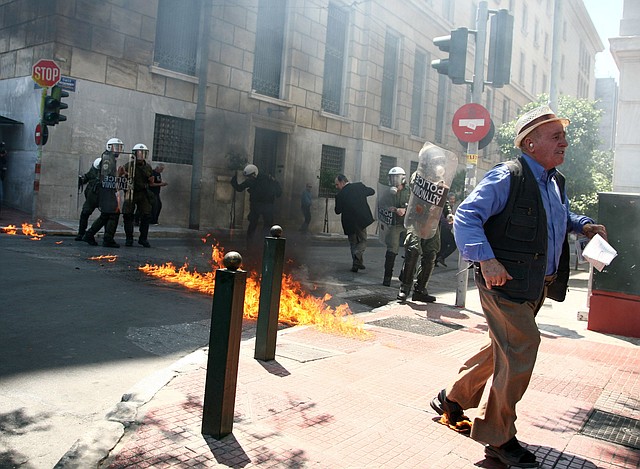Greeks riot over austerity plans
Government to raise taxes, cut spending to get foreign loans
A man with his foot on fire is among riot police and pedestrians trying Saturday to avoid gasoline bombs being thrown by protesters in Athens.
Sunday, May 2, 2010
ATHENS, Greece — Hundreds of youths rioted in Athens on Saturday, throwing Molotov cocktails and stones at police who responded with tear gas at a May Day rally against austerity measures being enacted by the cash-strapped government to secure foreign loans to stave off bankruptcy.
Police made at least nine arrests, including six people suspected of looting a shop. Seven officers were injured along with two demonstrators.
Responding to calls from the country’s two main labor unions, several thousand people marched in major Greek cities Saturday against the anticipated spending cuts and consumer tax increases.
http://hosted.ap.or…">Greece economy at a glance
In Athens, groups of blackclad anarchists in hoods and motorcycle helmets smashed three shop and hotel windows and set up barricades of burning trash bins. About 17,000 people took part in the march, according to police estimates.
Leftist and anarchist demonstrators heckled and threw plastic water bottles at former parliamentary Speaker Apostolos Kaklamanis, a governing Socialist lawmaker, after spotting him among pedestrians on the sidelines of the Athens march. Kaklamanis, 73, was hit and kicked but suffered no major injuries and was eventually whisked away by police.
The center-left government is set to announce more sweeping spending cuts through 2012 to win support for an international loan package worth $60 billion this year alone. The Cabinet meets this morning to approve the measures, with Finance Minister George Papaconstantinou expected to announce them at noon and then immediately fly to Brussels for an emergency meeting of eurozone finance ministers.
The International Monetary Fund has said it will provide the money over three years, along with Greece’s partners in the eurozone. IMF and EU negotiators began talks in Athens on April 21 and continued through Saturday evening at an Economy Ministry building away from the city center and the protesters.
TV channel Mega said the Greek delegation, led by Papaconstantinou, Economy Minister Louka Katseli and Defense Minister Evangelos Venizelos, had agreed on the essential measures and were still negotiating over the text of the law that will be submitted to Parliament as an emergency measure immediately after today’s Cabinet meeting. Venizelos, a legal and constitutional expert, was included in order to help draft the law, the TV channel reported.
“Negotiations are continuing,” Katseli said as she left the ministry Saturday evening. She did not comment on details.
French Finance Minister Christine Lagarde said Saturday after a meeting of French government officials that she was confident eurozone finance ministers would approve the package by the end of the weekend. Governments are discussing a package of up to $159 billion over three years, she said.
Belt-tightening measures that Athens announced in March proved insufficient, and additional austerity measures will likely include further hikes in consumer taxes and deeper cuts in pensions and public-service pay. Unions are furious.
“These measures are death. How people are going to live tomorrow, how they’re going to survive, I do not understand,” said Nikos Diamantopoulos, who was participating in a rally organized by pro-Communist unions.
Union members held a peaceful march to the Athens offices of the European Union and continued to the U.S. Embassy.
In the northern Greek city of Thessaloniki, where more than 5,000 people demonstrated, anarchists briefly clashed with police and smashed a few storefronts and ATMs.
Greek unions have called a nationwide general strike for Wednesday.
Conservative opposition party New Democracy and the right-wing populist LAOS have been critical of the government but are seen as likely to support the package of measures. Leftist parties have vowed to escalate protests.
German Chancellor Angela Merkel said Berlin is pushing for changes to the rules governing the eurozone, including the possibility of suspendingvoting rights for nations that do not uphold their commitments.
Merkel told the Bild am Sonntag weekly in comments released Saturday that European Union finance ministers would meet this month to discuss implementing changes to the bylaws for membership in the 16-nation eurozone.
The chancellor said the common currency had been one of the greatest European success stories, but that changes were needed to ensure its stability.
Information for this article was contributed by Elena Becatoros, Costas Kantouris, Greg Keller and Melissa Eddy of The Associated Press.
Front Section, Pages 7 on 05/02/2010
